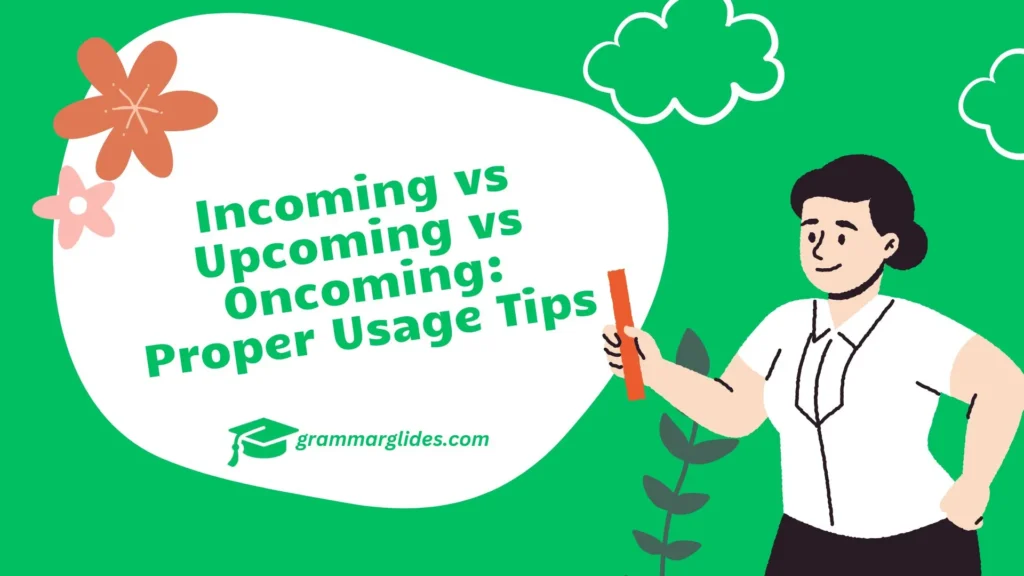Master the distinctions between incoming, upcoming, and oncoming to improve your communication with precision.
When it comes to describing things that are approaching or about to happen, we often use words like incoming, upcoming, and oncoming. These terms are similar but not interchangeable. Each one has a unique nuance, making it essential to understand when and how to use them correctly. This post will help you distinguish between these terms and use them with confidence, whether you’re writing an email, preparing a speech, or just having a conversation.
Do you find yourself unsure about which term to use? Don’t worry; by the end of this article, you’ll be able to pick the right word for every situation. We’ll break down each term, provide plenty of examples, and highlight common mistakes.
This article will give you a clear understanding of how to use incoming, upcoming, and oncoming correctly. We’ll start by defining each term, showing how they are used in context, and addressing common misunderstandings. Then, we’ll dive into practical tips for using these words effectively, as well as exercises to help you remember their proper usage.
Overview
The terms incoming, upcoming, and oncoming are all used to describe events or things that are approaching. While they may seem similar, they each carry specific meanings and are used in different contexts. Understanding the distinction between these words will improve your communication and ensure you’re always using the right term in the right situation. Let’s explore each term more closely, starting with incoming.
Defining “Incoming”
Meaning and Usage
The word incoming refers to something that is arriving or about to arrive, especially in terms of messages, calls, or shipments. It’s often used in the context of things that are physically coming toward you or incoming data.
For example, when you talk about incoming calls, you are referring to phone calls that are coming to you. Similarly, incoming mail refers to letters or packages that are on their way to your location.
Examples in Context
- The incoming plane is expected to land in 15 minutes.
- She quickly answered the incoming call from her boss.
- The incoming weather report warned of heavy rain later today.

- The team prepared for the incoming shipments from the warehouse.
- The incoming tide caused the boat to float higher on the water.
- I couldn’t keep up with all the incoming emails after being away.
- The incoming guests were greeted at the entrance by the host.
- We need to sort through the incoming orders before the store closes.
- The incoming traffic was backed up for miles on the highway.
- They were excited to receive the incoming invitation to the event.
Common Misunderstandings
People sometimes use incoming for things that are not specifically arriving or approaching. For instance, using incoming to describe an event that will happen in the future, like an upcoming meeting, is incorrect.
Exploring “Upcoming”
Meaning and Usage
The term upcoming is used to describe events, situations, or things that are going to happen in the near future. It’s about plans or scheduled events that haven’t yet occurred but are expected to. Upcoming is usually used with events, appointments, or activities.
For example, a conference that is scheduled for next week would be called an upcoming conference. It’s not about something physically arriving but about something planned or expected.
Examples in Context
- The upcoming concert has sold out all its tickets.
- I have an upcoming meeting with my manager tomorrow.
- He’s excited about the upcoming vacation next month.
- The upcoming seminar on digital marketing will be held at the community center.
- The team is preparing for the upcoming product launch next week.
- She’s been looking forward to her upcoming birthday party.
- We received an invitation for the upcoming wedding of our close friends.
- The upcoming exam is making me feel a little nervous.
- I need to review the agenda for the upcoming board meeting.
- The upcoming holiday season is always a busy time for retail businesses.
Typical Misuses
It’s incorrect to use upcoming for physical objects that are approaching, such as incoming shipments or oncoming traffic. Remember, upcoming refers to events, not physical objects.
Clarifying “Oncoming”
Meaning and Usage
The word oncoming typically refers to something that is physically approaching, especially in terms of vehicles or people. It’s often used in situations where something or someone is coming toward you or in your direction.
For example, oncoming traffic refers to vehicles that are moving toward you, and an oncoming storm refers to bad weather heading in your direction.
Examples in Context
- The driver quickly swerved to avoid the oncoming car.
- The oncoming train was visible in the distance.
- We could see the oncoming storm clouds as we walked through the park.
- The oncoming tide flooded the beach area.
- The oncoming floodwaters caused the riverbanks to overflow.
- He was able to dodge the oncoming cyclist while walking down the street.
- The oncoming rain forced us to cut the outdoor event short.
- The soldiers prepared for the oncoming battle.
- We could hear the sound of oncoming footsteps in the hallway.
- The oncoming truck was clearly visible through the fog.
Copys or Copies? Correct Plural Form You Need to Know
Common Confusions
People often confuse oncoming with upcoming because both refer to things that are approaching. However, oncoming is used when describing physical objects or forces that are coming toward you, while upcoming refers to planned or scheduled events.
Comparative Analysis: “Incoming,” “Upcoming,” and “Oncoming”
| Term | Meaning | Common Usage | Example | Context |
| Incoming | Refers to something arriving or about to arrive, often used for calls, messages, or shipments | Incoming calls, emails, planes, tides | The incoming call was from my sister. | Used for things arriving in your direction |
| Upcoming | Refers to events, appointments, or activities that are about to happen | Upcoming events, meetings, vacations | The upcoming meeting is crucial for the project. | Used for planned or scheduled events |
| Oncoming | Refers to something physically approaching or coming toward you | Oncoming traffic, storms, people | The oncoming vehicle was speeding down the road. | Used for things physically coming in your direction |
When to Use Each Term
Each of these terms has specific scenarios where they are best suited. Understanding the difference will help you communicate clearly and effectively.
- Use incoming when referring to things that are arriving, especially calls, messages, and physical shipments.
- Use upcoming for events, activities, or appointments that are scheduled to take place in the near future.
- Use oncoming when referring to things physically coming toward you, such as traffic, storms, or objects.
The Role of Context in Choosing the Right Term
Understanding context is key to choosing the right term. For example, if you are talking about a scheduled event, upcoming is the right choice. However, if you’re discussing something physically coming toward you, like a car or storm, oncoming is more appropriate.
Contextual Examples
- The incoming mail was filled with bills and advertisements.
- The upcoming wedding will be held at a beautiful vineyard.
- The oncoming train was visible from a distance, but it wasn’t moving fast.
Common Mistakes and How to Avoid Them
Here are 15 mistakes to watch out for when using incoming, upcoming, and oncoming:
- Using incoming to describe scheduled events.
- Saying upcoming when referring to things physically approaching.
- Confusing oncoming with incoming for things like calls or messages.
- Using oncoming to describe planned events.
- Using upcoming to describe physical objects arriving.
- Overusing incoming when upcoming is more appropriate.
- Mixing up oncoming with upcoming in casual conversation.

- Using upcoming for something already past.
- Using oncoming for something that’s planned.
- Using incoming when something is not arriving soon.
- Using oncoming for things that don’t physically come toward you.
- Saying incoming when you mean oncoming.
- Using upcoming for something that’s already scheduled.
- Using oncoming for events that are scheduled.
- Not recognizing the context when choosing between the three terms.
Correction Tips
- Choose incoming for things that are about to arrive soon.
- Use upcoming for events or appointments in the future.
- Reserve oncoming for things physically approaching.
- Avoid using incoming for events or activities.
- Use upcoming for future events, not physical items.
- Remember that oncoming refers to physical movement toward you.
- Don’t mix up oncoming with upcoming in event contexts.
- Always choose upcoming for planned occasions.
- Avoid using oncoming for things that are expected, not physical.
- Use incoming for data, calls, or things arriving soon.
- Be cautious of context when choosing between incoming and oncoming.
- Make sure upcoming is used for future events, not physical things.
- Use oncoming only for physical, tangible movements.
- Recognize that upcoming doesn’t apply to tangible things.
- Practice choosing the right term in real-life scenarios.
Enhancing Your Vocabulary: Practical Tips
Memory Aids
To remember when to use each term, try these tips:
- Incoming: Think of things arriving at your door.
- Upcoming: Think of things you’ve planned or scheduled.
- Oncoming: Think of things coming toward you in a straight line.
Practice Exercises
- Fill in the blank: “I have an ________ appointment with my dentist next week.”
- Choose the correct word: “The ________ rainstorm forced us to cancel the picnic.”
- Correct the mistake: “We were excited about the ________ storm heading our way.”
Key Insight
Is there a difference between “incoming” and “oncoming”?
Yes, incoming refers to things arriving, like calls or packages, while oncoming is for things physically moving toward you, like cars or weather systems.
Can I use “upcoming” for things that are happening right now?
No, upcoming refers to future events, not things happening in the present.
Can “incoming” be used for events or appointments?
No, incoming is typically used for things that are physically arriving or messages/calls. Use upcoming for events.
Which word should I use to describe an approaching car?
You should use oncoming when referring to an approaching car.
What’s the best way to remember the differences between these terms?
Focus on the context: incoming is for arrivals, upcoming is for scheduled events, and oncoming is for things physically approaching.
Wrap Up
Mastering the use of incoming, upcoming, and oncoming will improve your communication and help you express ideas more clearly. By understanding the specific meaning and context of each word, you’ll avoid common mistakes and sound more precise in both writing and conversation. So next time you talk about something arriving or approaching, you’ll know exactly which word to use!

Hi! I’m Lauren Reynolds, the author of Grammar Glides. I create easy-to-follow content that helps you master English with confidence. Let’s make learning English simple and enjoyable together!

